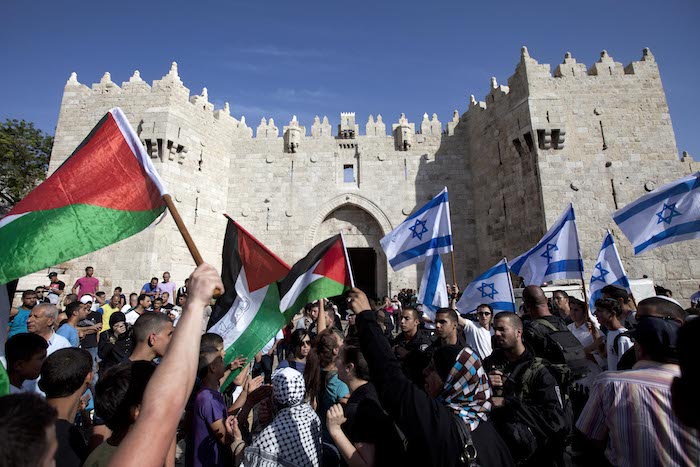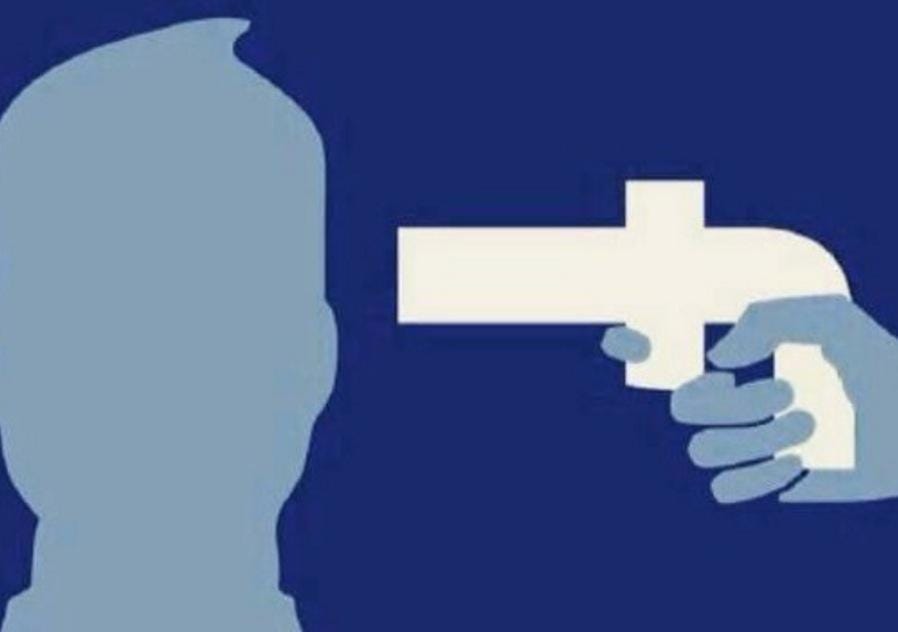Facebook kowtows to Israeli demands
Reports from Adalah and The Independent

Arab Israelis wave Palestinian flags during a rally commemorating Land Day on March 30, 2014 in the northern Arab-Israeli town of Arrabe. Photo by AFP
Adalah to Attorney General: Order police to stop arresting citizens for raising Palestinian flag
Between 2011 and 2015, police arrested 96 citizens of Israel suspected of waving Palestinian flag; indictments were filed in 45 cases. Nothing in Israeli law forbids flying Palestinian flag.
Press Release from Adalah
November 02, 2016
Adalah – The Legal Centre for Arab Minority Rights in Israel– on 26 September 2016 asked Israeli Attorney General (AG) Avichai Mandelblit to issue an order to the State Attorney and Israel Police to refrain from arresting and indicting citizens and residents of Israel for raising the Palestinian flag.
According to Israeli police statistics provided to The Movement for Freedom of Information, police arrested 96 Israeli citizens on suspicion of waving the Palestinian flag between 2011 and 2015. Indictments were filed in 45 of these cases (47%).

Asserting identity – Palestinians counter the nationalism of Jerusalem Day celebrants with their own flags outside Damascus Gate in May 8, 2013. Photo by Sebastian Scheiner/Associated Press.
In his letter to the AG, Adalah Attorney Mohammad Bassam stressed that there is no legal directive forbidding the raising of the Palestinian flag.
“The Palestinian flag is not the flag of a terrorist organization. It is recognized and flies at the United Nations as the official flag of the Palestinian Authority (PA) and there is nothing on the law books forbidding one to fly it. The High Court of Justice likewise does not see the Palestinian flag as symbolizing a terror organization or as a symbol of support for terrorism.
The Supreme Court permitted a number of Arab parties to broadcast television election campaign ads in which images of the Palestinian flag appeared. Given that the Supreme Court has ruled the Palestinian flag may appear in election campaign broadcasts as an aspect of freedom of speech, there is no justification in placing limitations on the flag on the basis that it harms public sentiment.”
Adalah also emphasized that the AG and Police Commissioner have already ruled that there is no legal obstacle to raise or fly the Palestinian flag.
The AG’s position filed within the framework of Supreme Court case HCJ 5883/93 makes clear that, in light of the development of ties between the State of Israel and the Palestine Liberation Organization (PLO) in the wake of the Oslo agreement and of the mutual recognition between Israel and the PLO, there is no public interest in enforcing the ban on flying the flag. Furthermore, then-Israel Police Commissioner Rafi Peled was quoted in a court ruling as stating that, “in the wake of the peace agreement, the PLO does not constitute a terror organization and the raising of the PLO flag therefore does not constitute a crime.”
Adalah Attorney Bassam argued that, “the above positions clarify that arrests and indictments of citizens for raising the Palestinian flag stand in opposition to the law. This was further reinforced once the Palestinian Authority was granted non-member observer status at the United Nations and the flag is today recognized not as the PLO flag but rather as the Palestinian or the PA flag.”
Adalah demands the Israeli AG issue an order forbidding the arrest and trying of citizens and residents who raise or fly the Palestinian flag.

Illustration from 2007 article noting the rapid take up of Facebook in Arab countries.
Social media giant accused of disabling accounts of activists and journalists following talks with Israeli ministers last month on how to tackle ‘incitement’ on the platform
By Bethan McKernan, The Independent
October 24, 2016
A new report from a Palestinian rights organisation has found that the number of incidents in which people – including many journalists – have been arrested for social media posts has drastically increased in the last year, leading to worries over an Israeli crackdown on the right to freedom of expression.
“Social media sites are… an efficient window to empower journalists and Palestinians in general to express their opinions freely,” Mousa Rimawi, author of the report and Director of the Palestinian Centre for Development and Media Freedoms (Mada) said.
“[But] systematic surveillance and observation by Israeli Occupation Authorities [means they have become] an open platform for persecution and oppression relating to users’ opinions.”
While there is no legal precedent in Israeli law for charging people with criminal offences related to online posts, the state, worried that inflammatory content online has fuelled a spike in Israeli-Palestinian violence in the last 12 months, created a cybercrime unit in October 2015 to monitor and control what is published on the internet.
In addition, Israeli authorities are also pressuring social media companies to do more to remove posts which could incite violence, including drafting laws – which digital rights groups say would be unworkable – to compel platforms to take down content that could incite violence.
A delegation from Facebook met with government officials in September for what were were described as “successful” talks by Interior Minister Gilad Erdan’s office. “Online extremism can only be tackled with a strong partnership between policymakers, civil society, academia and companies, and this is true everywhere,” a representative for Facebook said, adding that the company meets with governments all over the world to combat hate speech and incitement to violence.

Image used by activists critical of blocks and restrictions placed on the Facebook accounts of Palestinian activists and journalists
This week, the activist collective Palestinian Information Centre (PIC) reported that at least 10 of their administrators’ accounts for their Arabic and English Facebook pages – followed by more than two million people – have been suspended, seven of them permanently, which they say is a result of new measures put in place in the wake of Facebook’s meeting with Israel.
Facebook gave no explanation why other than that members had violated Facebook’s ‘Community Standards’, PIC member Rami Salaam told The Independent. The move was about “preventing our voice from reaching out to the world,” rather than incitement, he said.
Facebook took down a Palestinian businessman’s video reported by Israelis. Facebook did not bother to check
One video Mr Salaam said was taken down, of a college graduate in Gaza starting a small business, was removed because it contained nudity – even though it didn’t. “Seemingly the video was reported by Israelis and Facebook did not even bother to check,” he added. A representative from Facebook told The Independent it was looking into the claims made by PIC.
“We care about the voices, opinion and rights of all the different communities on Facebook,” he added. “Palestinian voices will be as safe on Facebook as every other community on our platform.”
A 2015 report found that 96 per cent of Palestinians said their primary use of Facebook was for following news. Mada says that this shows the extreme importance of social media platforms and thus the potential impact disabling activists’ and journalists’ accounts could have for the dissemination of information relevant to Palestinian interests.
Since last October at least 150 arrests have been made on charges of ‘incitement’, but Palestinians and digital rights monitors say that in many cases posts are not relevant, or critical of Israeli government policy, rather than direct calls to violence.
Since 2014, 61 Palestinian journalists and nine Israeli journalists have been prosecuted for online posts, the new report from Mada found.
In August, five journalists at Hebron start-up Sanabel Radio were also arrested in a dawn raid during what an Israeli army spokesperson said was an “ongoing effort against incitement.”
Last month, several senior journalists from Shehab and Quds news agencies in the West Bank reported their Facebook accounts – used to update professional pages which reach millions of people – had been temporarily suspended, in a move Facebook later said had been an error.
Facebook ‘likes’ and ‘shares’ have also been submitted as evidence in military trials for incitement, West Bank legal charity Addameer told The Independent, as was reported in the sentencing of a Palestinian astrophysics professor supportive of militant group Hamas earlier this month.
“Prosecutors use the numbers of ‘likes’ and ‘shares’ of specified posts, while failing to connect these posts or these individuals, to acts of violence. The trend is an alarming one,” Addameer director Sahar Francis told The Independent at the time. The Israeli Defence Force did not immediately respond to a request for comment.
Many Palestinians have called for boycotts of the company for perceived collusion with the Israeli authorities and worries over the fact Facebook activity could be used to target activists.
Mr Salaam of PIC said that Facebook was too important a platform for the group to leave.
“While we feel frustrated and distracted, we’re more determined to continue our activism for Palestine… We utilise all available platforms, even those trying to silence us, to make sure Palestine’s voice is heard loud and clear,” he said.
